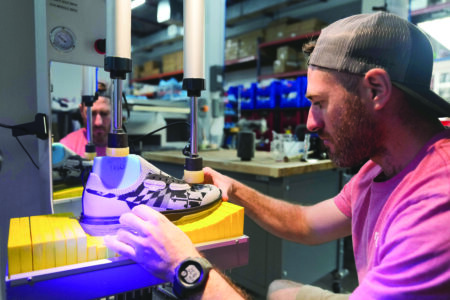NMU recipient of Native American Heritage Fund grant
Renewing a language

Northern Michigan University offers courses about the Anishinaabe community and other topics. (Photo by Christie Bleck)
MARQUETTE — Northern Michigan University is the recipient of about $134,600 from the Native American Heritage Fund to expand Anishinabek language course offerings at undergraduate and graduate levels.
The NAHF awarded nearly $480,000 in grants during the 2019 NAHF check distribution held Sept. 30 at FireKeepers Casino Hotel in Battle Creek.
With the money, the NMU Center for Native American Studies will embark on a new initiative, the Anishinaabe Learning Community Project. The ALCC will create two new Anishinaabemowin courses that align with existing courses.
Jud Sojourn, Ph.D., assistant professor at the Center for Native American Studies, will lead the project and will spend one academic year researching, building and developing multiple curriculum proposals.
“It’s going to be for the enhancement of two existing undergraduate courses, one in tribal law and government and the other in Michigan-Wisconsin tribal relations, which is a lot like treaties,” Sojourn said.

Instructor Leora Lancaster teaches Anishinaabemowin, or Ojibwe Language 101, in the fall of 2018 at Northern Mchigan University. NMU has received about $134,600 from the Native American Heritage Fund to expand language course offerings at undergraduate and graduate levels. (Photo courtesy of NMU)
Two new graduate courses will support the potential development of a graduate program in Anishinaabemowin documentation and translation.
He believes the course offerings will be important for students and non-students alike
“If we can get the word out, it will be able to grow naturally this way,” Sojourn said. “I’m hoping to kind of normalize the word ‘Anishinaabe’ in the community, and the pronunciations so people don’t feel shy about saying it.”
For instance, Sojourn said he hopes to normalize the word “aaniin,” which means “hi.”
People in general — not just students — can get a lot out of learning the language, he said.
“One of the benefits for people, the broader community, to study Anishinaabe language is that the language itself holds knowledge about respect for the land, appreciation and respect, understanding, of community governance where everybody’s equal,” Sojourn said.
The NMU grant proposal stated: “Creating new undergraduate Anishinaabemowin curricula forwards the goal of tribal nations to address language renewal. Language renewal creates stronger indigenous identity and perspective for First Peoples and greater understanding of First Peoples for all students.”
The ALLC Project, it read, is founded on the belief that a deeper knowledge of the first language of this territory will further add to the accuracy of the history of the Anishinaabe tribes as well as the role of tribal nations within Michigan.
The proposal also stated the project is designed to address three challenges facing the state’s tribal nations: the endangered status of the Anishinaabe language, low numbers of students graduating from Michigan universities with a distinct concentration in Anishinaabe language learning, and the significantly low number of K-12 Anishinaabe language teachers statewide.
NMU’s Center for Native American Studies implemented the first and only Native American Studies major during the fall 2016 semester. The center offers a holistic curriculum rooted in Native American themes that challenges students to think critically and communicate effectively about indigenous issues.
The other NAHF grant recipients were:
≤ Bay de Noc Community College – $6,000 to publicly acknowledge the Treaty of 1836 through a public plaque on each campus and a Treaty Day celebration;
≤ Godfrey-Lee Public Schools – $98,000 to rebrand the current mascot from “Rebels” to a new mascot and nickname that is culturally responsive;
≤ Grand Rapids Community College – $5,285 to support the Grand Rapids Community College Education and Reconciliation Project, including a trip to the Ziibawing Center of Anishinaabe Culture and Lifeways and a Native American Speaker’s Forum;
≤ Indigenous Law and Policy Center at Michigan State University College of Law – $20,000 to provide a two-day symposium, Native Family Day and ancillary programming throughout the year;
≤ Monroe County Community College – $199,234 to create curriculum and a set of immersion experiences for K-12 students, focused on how to research stories from the Native perspective; and
≤ The Friendship Community/LIFT Teen Center – $16,650 to support an overnight backpacking trip to South Manitou Island, exposing students to the history of the Ottawa tribe.
The NAHF is a funding initiative that supports and promotes positive relationships and accurate information about the history and role of Michigan’s Indian tribes and Native Americans in the state.
“During the past two years, NHBP has been amazed and humbled that so many applicants have applied for funding,” said NHBP Tribal Council Vice Chairperson Dorie Rios, who also serves as the vice chairperson of the NAHF Board, in a news release. “It is an honor to be able to lead the way with this initiative and offer funding to help strengthen the relationships between Tribes and communities across the state.
“We look forward to seeing how this assistance will generate understanding, kindness and acceptance about the Native culture and history of Michigan’s 12 federally recognized tribes.”
In addition to Rios, the NAHF Board is composed of: Chairwoman Jamie Stuck; Secretary Elizabeth Kinnart, Sault Ste. Marie Tribe of Chippewa Indians citizen; Treasurer Melissa Kiesewetter, Michigan Department of Civil Rights tribal liaison/Native American specialist; and board member Kimberly Vargo, Grand Traverse Band of Ottawa and Chippewa vice chairwoman.
Christie Bleck can be reached at 906-228-2500, ext. 250.
- Northern Michigan University offers courses about the Anishinaabe community and other topics. (Photo by Christie Bleck)
- Instructor Leora Lancaster teaches Anishinaabemowin, or Ojibwe Language 101, in the fall of 2018 at Northern Mchigan University. NMU has received about $134,600 from the Native American Heritage Fund to expand language course offerings at undergraduate and graduate levels. (Photo courtesy of NMU)







